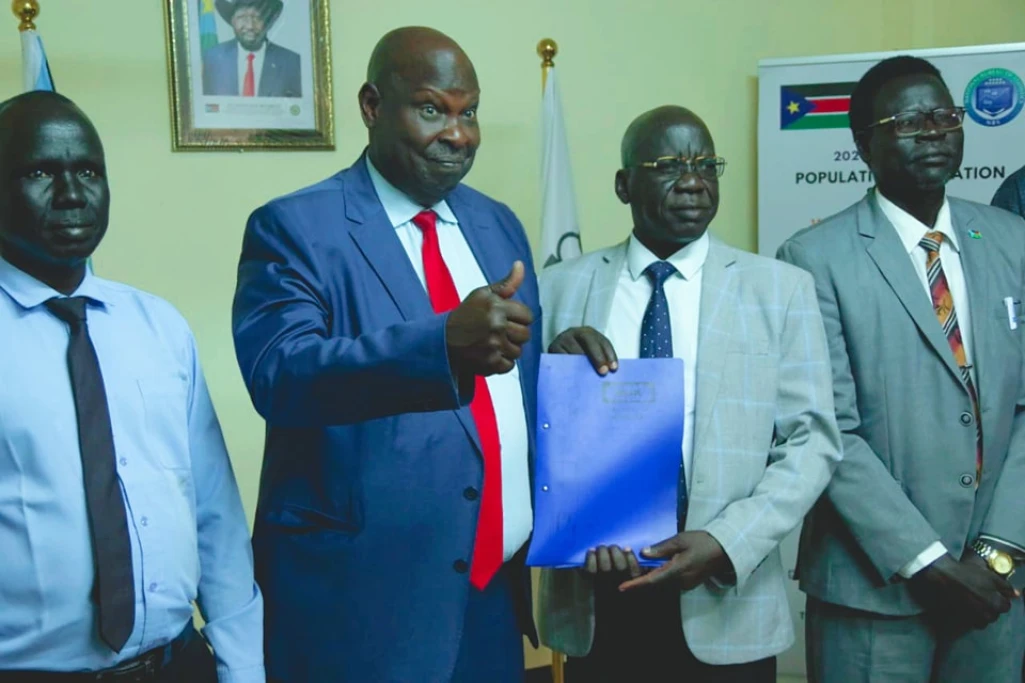
The administration of the Ngok Dinka in Abyei, a border area disputed by both Sudan and South Sudan, has intensified efforts to establish their identity as South Sudan prepares for its first-ever general elections in 2026.
The government of the disputed area, both the executive and
the legislature have endorsed the results of the October 31, 2013, referendum,
in which 99% of the Ngok Dinka community voted to fully join South Sudan.
"The Abyei Area Legislative Council (AALC) adopted and
unanimously endorsed, on Friday, 27th December 2024, the results of the Abyei
Area Community Referendum of October 2013. The endorsed results were
subsequently handed over to the Chief Administrator of the Special
Administrative Area,” said Hon. Dr. Yak Deng Ater, Speaker of the Abyei Area
Legislative Council.
The Speaker emphasized the importance of the endorsement for
the overall benefit of the people of Abyei, stating that it would strengthen
the region's political and legal standing, ensure recognition of the Ngok
Dinka's right to self-determination, and pave the way for greater stability and
development.
He further explained that this decision is crucial for
securing the community’s future, fostering unity, and ensuring their voice is
heard in the larger political context of South Sudan.
“It is worth mentioning that on Monday, December 23, 2024,
the Abyei Area Executive Council received the official results of the Abyei
Area Community Referendum of October 31, 2013, adopted them, and unanimously
endorsed them, paving the way for the legislature to endorse them on December
27, 2024,” Dr. Yak added.
The 8th Governors' Forum held in Juba called for increased
efforts to recognize the 2013 Ngok Dinka community referendum in order to
settle Abyei's final status.
However, the resolutions on Abyei were withdrawn during the
official reading of the resolutions and were announced to have been moved to a
higher level. This left the people of Abyei disappointed and seeking answers.
'Where do we belong?' the Ngok Dinka asked after
the withdrawal of resolutions on Abyei's final status.
Nevertheless, the efforts recommended by the forum were
implemented at the area level, and the results of the community referendum were
endorsed at all levels of government.
"The need for endorsement came as a recommendation from
the 8th Governors' Forum. The forum recommended that the Abyei Area Legislative
Council (AALC) officially endorse the results before the Revitalized
Transitional National Legislative Assembly (R-TNLA) could endorse them and have
them officially recognized by the National Government (R-TGONU) in Juba,” said Abionweng
Majith Diing, the area Minister of Local Government and Law Enforcement during
the submission of the results to the legislative council for endorsement.
Edmund Yakani, a civil society activist and executive
director of the Community Empowerment for Progress Organization (CEPO), also
expressed his disappointment over the withdrawal of Abyei's final status
resolutions from the resolutions of the 8th Governors’ Forum.
He raised concerns about the rights of the Ngok Dinka to
vote if South Sudan conducts elections.
"I think the government of South Sudan has demonstrated
a sense of fear and a sense of not taking care of Abyei as one of the
administrative areas in our country, and if we are going to face an election,
the message is now clear that the election will not consider our brothers and
sisters from Abyei,” Yakani stated.
Despite the challenges, the area is racing to meet the
timeline for the general elections scheduled for December 2026 by intensifying
efforts to ensure that Juba recognizes and endorses the community's decision,
accepting them as part of South Sudan.
Amb. Dr. Chol Deng Alak, Chief Administrator of Abyei, met
with Maj. Gen. Robert Yaw Affram, Acting Head of Mission and Force Commander of
the United Nations Interim Security Force for Abyei (UNISFA), to discuss issues
including the delivery of the endorsed referendum results to the national
government in Juba for official recognition and endorsement.
“The meeting discussed a range of issues related to Abyei,
including the recent adoption and endorsement of the Abyei Area Community
Referendum results of October 2013, by both the Area Executive Council and the
Area Legislative Council, as well as the plan to deliver the endorsed results
to the national government for official endorsement and recognition,” said Deng
Kiir Matier, the Minister for Physical Infrastructure and Acting Minister for
Information, Culture, Youth, and Sports.
Abyei is the ancestral land of the Ngok Dinka, though it has
historically seen seasonal migrations of herders from the northern Arab
Misseriya tribe, who bring their cattle to graze and trade during the dry
season.
In 1972, following Sudan’s first civil war, the Addis Ababa
Agreement granted Abyei the right to hold a referendum to decide whether to
remain part of northern Sudan or join the newly formed southern region.
However, Sudan did not uphold the agreement, as President Jaafar Nimeiri
refused to allow the referendum.
It entered another war in 1983, which ended in 2005 with the
signing of the Comprehensive Peace Agreement (CPA). This agreement included the
Abyei Protocol, which designated the region under special administrative
status.
The agreement also stipulated a future referendum for Abyei
residents to decide whether the area would join Sudan or South Sudan.
In October 2013, the Ngok Dinka held a referendum where 99
percent voted for Abyei to become part of South Sudan.
However, neither Sudan nor South Sudan recognized the results of the vote. In 2015, South Sudan established the Abyei Special Administrative Area as one of its three administrative areas to fill the administrative vacuum left by Sudan’s unilateral dissolution of the joint administration.